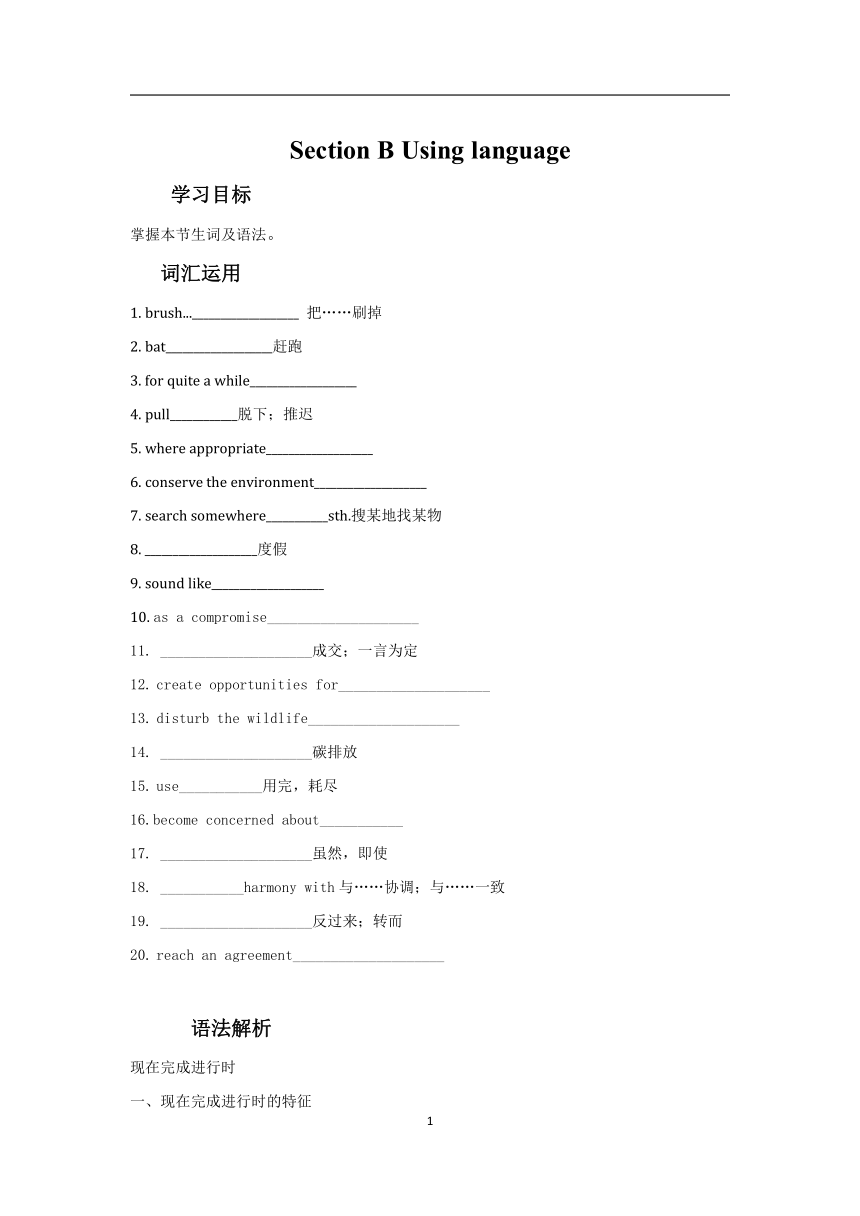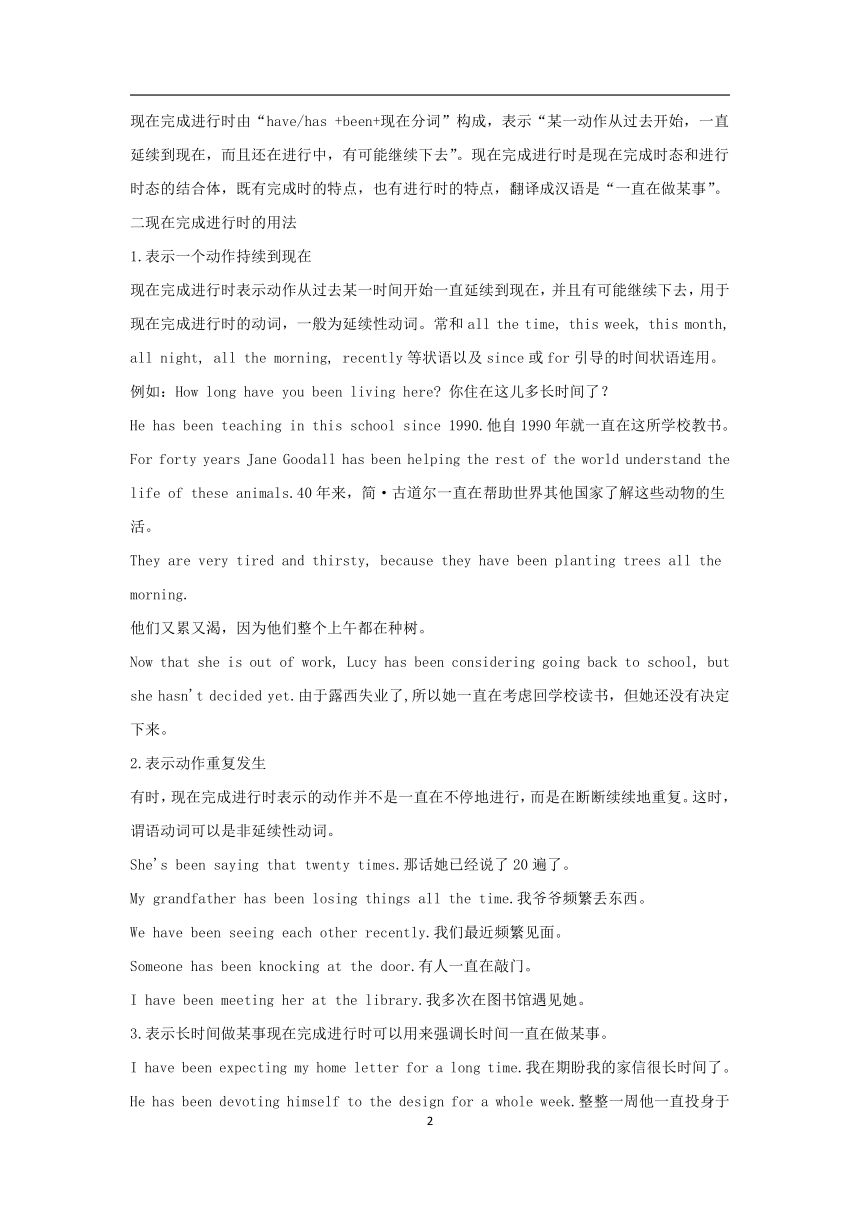外研版(2019)选择性必修第一册Unit 6 Nurturing nature Section B Using Language学案(有答案)
文档属性
| 名称 | 外研版(2019)选择性必修第一册Unit 6 Nurturing nature Section B Using Language学案(有答案) |  | |
| 格式 | doc | ||
| 文件大小 | 41.5KB | ||
| 资源类型 | 教案 | ||
| 版本资源 | 外研版(2019) | ||
| 科目 | 英语 | ||
| 更新时间 | 2022-10-13 16:54:01 | ||
图片预览


文档简介
Section B Using language
学习目标
掌握本节生词及语法。
词汇运用
1. brush...___________________ 把……刷掉
2. bat___________________赶跑
3. for quite a while___________________
4. pull____________脱下;推迟
5. where appropriate___________________
6. conserve the environment____________________
7. search somewhere___________sth.搜某地找某物
8. ____________________度假
9. sound like____________________
10. as a compromise____________________
11. ____________________成交;一言为定
12. create opportunities for____________________
13. disturb the wildlife____________________
14. ____________________碳排放
15. use___________用完,耗尽
16.become concerned about___________
17. ____________________虽然,即使
18. ___________harmony with与……协调;与……一致
19. ____________________反过来;转而
20. reach an agreement____________________
语法解析
现在完成进行时
一、现在完成进行时的特征
现在完成进行时由“have/has +been+现在分词”构成,表示“某一动作从过去开始,一直延续到现在,而且还在进行中,有可能继续下去”。现在完成进行时是现在完成时态和进行时态的结合体,既有完成时的特点,也有进行时的特点,翻译成汉语是“一直在做某事”。
二现在完成进行时的用法
1.表示一个动作持续到现在
现在完成进行时表示动作从过去某一时间开始一直延续到现在,并且有可能继续下去,用于现在完成进行时的动词,一般为延续性动词。常和all the time, this week, this month, all night, all the morning, recently等状语以及since或for引导的时间状语连用。
例如:How long have you been living here 你住在这儿多长时间了?
He has been teaching in this school since 1990.他自1990年就一直在这所学校教书。
For forty years Jane Goodall has been helping the rest of the world understand the life of these animals.40年来,简·古道尔一直在帮助世界其他国家了解这些动物的生活。
They are very tired and thirsty, because they have been planting trees all the morning.
他们又累又渴,因为他们整个上午都在种树。
Now that she is out of work, Lucy has been considering going back to school, but she hasn't decided yet.由于露西失业了,所以她一直在考虑回学校读书,但她还没有决定下来。
2.表示动作重复发生
有时,现在完成进行时表示的动作并不是一直在不停地进行,而是在断断续续地重复。这时,谓语动词可以是非延续性动词。
She's been saying that twenty times.那话她已经说了20遍了。
My grandfather has been losing things all the time.我爷爷频繁丢东西。
We have been seeing each other recently.我们最近频繁见面。
Someone has been knocking at the door.有人一直在敲门。
I have been meeting her at the library.我多次在图书馆遇见她。
3.表示长时间做某事现在完成进行时可以用来强调长时间一直在做某事。
I have been expecting my home letter for a long time.我在期盼我的家信很长时间了。
He has been devoting himself to the design for a whole week.整整一周他一直投身于这个设计。She has been doing this in order to repay the boy's kindness.为了报答那个男孩的好意,她一直在这样做。
I have been looking forward to seeing my family.我一直期盼着见到我的家人。
My grandma has been warning us of our studies.我奶奶一直在提醒我们学习。
4.表示与现在的状态有关
Sorry, I'm late. Have you been waiting long 对不起,我迟到了。你等了很久了吗?
You don't look well. Have you been working too hard 你看起来很不舒服。你工作是不是太辛苦了?
He's been working on this book for six years, and all for nothing.六年来他一直在写这本书,但都是徒劳无功的。
三现在完成进行时和现在完成时的区别
1.现在完成进行时和现在完成时均可表示从过去开始一直持续到现在的动作,但现在完成时表示动作已结束,着重于结果;现在完成进行时表示的动作可能已完成也可能未完成,更强调动作的持续进行。
比较:
I have read the book.我读过这本书。(已读完)
I have been reading the book.我一直在读这本书。(还在读,没读完)
You have written your paper.你的论文写完了。(已写完)
You have been writing your paper. Please have a rest.你一直在写论文,请休息一下。(还在写,未写完)
通过上面的对比,我们发现,同一个动词的现在完成时和现在完成进行时有如此大的差别,即用现在完成时表示“终止”,用现在完成进行时则表示“延续”。所以,时态的使用应根据语境作出正确选择。
2.一般而言,延续性动词(有的语法书叫静态动词)跟一段时间连用(如for...since..)时,其现在完成时和现在完成进行时意思基本相同,意味着动作到目前都没有结束。这类动词有live,stay,remain,sit,stand,lie,wait,rest,work,learn,study,sleep,rain等。
She has lain in bed for a week.
She has been lying in bed for a week. (更常见)她已经卧床一周了。
I have waited for you for two hours.
I have been waiting for you for two hours.(更常见) 我已经等你两个小时了。3.延续性动词的现在完成时和现在完成进行时若与时间段状语连用,可表示状态延续至今;如果没与时间段状语连用,则表示动作或状态在过去发生过或存在过,但现在已结束。
试比较:They have lived here since 1970./They have been living here since 1970.
自1970年以来,他们一直住在这儿。(现仍然住在这儿)
They have lived here.他们曾经在这儿住过。(现已不住在这儿)
以上例句说明,延续性动词与时间段状语连用是“非终止用法”,也叫延续性用法,说话时该动作或状态尚未结束;不与时间段状语连用是“终止用法”,也叫非延续性用法,说话时该动作或状态已经结束。
练习:
1. —I have got a headache.
—No wonder. You______ (work) in front of that computer too long.
2. Since the time humankind started gardening, we______ (try) to make our environment more beautiful.
3. The girl has a great interest in sports and______ (take) badminton classes twice a week over the last three years.
4. The manager ______ (tell) the workers how to improve the program since 9 am.
5. ---Why do you want to work for our company
—This is the job that I______ (look) for since my graduation.
6. I have to see the doctor because I_______ (cough) a lot lately.
7. I'm tired out. I_______ (shop) all afternoon and I don't seem to have finished anything.
8.---We've spent too much money recently.
---Well, it isn't surprising. Our friends and relatives ______ (come) around all the time.
答案
词汇运用:1.off 2.away 3.相当长的一段时间 4.off 5.在适当的地方;在合适的地方 6.保护环境 7.for 8.go on a holiday 9.听起来像……10.作为妥协 11.it’s a deal 12.为……创造机会 13.干扰野生动植物 14.carbon emissions 15.up 16.关心;挂念 17.even though/ even if 18.in 19.in turn 20.达成协议;取得一致意见
语法解析:1.have been working 2.have been trying 3.has been taking 4.has been telling 5.have been looking 6.have been coughing 7.have been shopping 8.have been coming
2
学习目标
掌握本节生词及语法。
词汇运用
1. brush...___________________ 把……刷掉
2. bat___________________赶跑
3. for quite a while___________________
4. pull____________脱下;推迟
5. where appropriate___________________
6. conserve the environment____________________
7. search somewhere___________sth.搜某地找某物
8. ____________________度假
9. sound like____________________
10. as a compromise____________________
11. ____________________成交;一言为定
12. create opportunities for____________________
13. disturb the wildlife____________________
14. ____________________碳排放
15. use___________用完,耗尽
16.become concerned about___________
17. ____________________虽然,即使
18. ___________harmony with与……协调;与……一致
19. ____________________反过来;转而
20. reach an agreement____________________
语法解析
现在完成进行时
一、现在完成进行时的特征
现在完成进行时由“have/has +been+现在分词”构成,表示“某一动作从过去开始,一直延续到现在,而且还在进行中,有可能继续下去”。现在完成进行时是现在完成时态和进行时态的结合体,既有完成时的特点,也有进行时的特点,翻译成汉语是“一直在做某事”。
二现在完成进行时的用法
1.表示一个动作持续到现在
现在完成进行时表示动作从过去某一时间开始一直延续到现在,并且有可能继续下去,用于现在完成进行时的动词,一般为延续性动词。常和all the time, this week, this month, all night, all the morning, recently等状语以及since或for引导的时间状语连用。
例如:How long have you been living here 你住在这儿多长时间了?
He has been teaching in this school since 1990.他自1990年就一直在这所学校教书。
For forty years Jane Goodall has been helping the rest of the world understand the life of these animals.40年来,简·古道尔一直在帮助世界其他国家了解这些动物的生活。
They are very tired and thirsty, because they have been planting trees all the morning.
他们又累又渴,因为他们整个上午都在种树。
Now that she is out of work, Lucy has been considering going back to school, but she hasn't decided yet.由于露西失业了,所以她一直在考虑回学校读书,但她还没有决定下来。
2.表示动作重复发生
有时,现在完成进行时表示的动作并不是一直在不停地进行,而是在断断续续地重复。这时,谓语动词可以是非延续性动词。
She's been saying that twenty times.那话她已经说了20遍了。
My grandfather has been losing things all the time.我爷爷频繁丢东西。
We have been seeing each other recently.我们最近频繁见面。
Someone has been knocking at the door.有人一直在敲门。
I have been meeting her at the library.我多次在图书馆遇见她。
3.表示长时间做某事现在完成进行时可以用来强调长时间一直在做某事。
I have been expecting my home letter for a long time.我在期盼我的家信很长时间了。
He has been devoting himself to the design for a whole week.整整一周他一直投身于这个设计。She has been doing this in order to repay the boy's kindness.为了报答那个男孩的好意,她一直在这样做。
I have been looking forward to seeing my family.我一直期盼着见到我的家人。
My grandma has been warning us of our studies.我奶奶一直在提醒我们学习。
4.表示与现在的状态有关
Sorry, I'm late. Have you been waiting long 对不起,我迟到了。你等了很久了吗?
You don't look well. Have you been working too hard 你看起来很不舒服。你工作是不是太辛苦了?
He's been working on this book for six years, and all for nothing.六年来他一直在写这本书,但都是徒劳无功的。
三现在完成进行时和现在完成时的区别
1.现在完成进行时和现在完成时均可表示从过去开始一直持续到现在的动作,但现在完成时表示动作已结束,着重于结果;现在完成进行时表示的动作可能已完成也可能未完成,更强调动作的持续进行。
比较:
I have read the book.我读过这本书。(已读完)
I have been reading the book.我一直在读这本书。(还在读,没读完)
You have written your paper.你的论文写完了。(已写完)
You have been writing your paper. Please have a rest.你一直在写论文,请休息一下。(还在写,未写完)
通过上面的对比,我们发现,同一个动词的现在完成时和现在完成进行时有如此大的差别,即用现在完成时表示“终止”,用现在完成进行时则表示“延续”。所以,时态的使用应根据语境作出正确选择。
2.一般而言,延续性动词(有的语法书叫静态动词)跟一段时间连用(如for...since..)时,其现在完成时和现在完成进行时意思基本相同,意味着动作到目前都没有结束。这类动词有live,stay,remain,sit,stand,lie,wait,rest,work,learn,study,sleep,rain等。
She has lain in bed for a week.
She has been lying in bed for a week. (更常见)她已经卧床一周了。
I have waited for you for two hours.
I have been waiting for you for two hours.(更常见) 我已经等你两个小时了。3.延续性动词的现在完成时和现在完成进行时若与时间段状语连用,可表示状态延续至今;如果没与时间段状语连用,则表示动作或状态在过去发生过或存在过,但现在已结束。
试比较:They have lived here since 1970./They have been living here since 1970.
自1970年以来,他们一直住在这儿。(现仍然住在这儿)
They have lived here.他们曾经在这儿住过。(现已不住在这儿)
以上例句说明,延续性动词与时间段状语连用是“非终止用法”,也叫延续性用法,说话时该动作或状态尚未结束;不与时间段状语连用是“终止用法”,也叫非延续性用法,说话时该动作或状态已经结束。
练习:
1. —I have got a headache.
—No wonder. You______ (work) in front of that computer too long.
2. Since the time humankind started gardening, we______ (try) to make our environment more beautiful.
3. The girl has a great interest in sports and______ (take) badminton classes twice a week over the last three years.
4. The manager ______ (tell) the workers how to improve the program since 9 am.
5. ---Why do you want to work for our company
—This is the job that I______ (look) for since my graduation.
6. I have to see the doctor because I_______ (cough) a lot lately.
7. I'm tired out. I_______ (shop) all afternoon and I don't seem to have finished anything.
8.---We've spent too much money recently.
---Well, it isn't surprising. Our friends and relatives ______ (come) around all the time.
答案
词汇运用:1.off 2.away 3.相当长的一段时间 4.off 5.在适当的地方;在合适的地方 6.保护环境 7.for 8.go on a holiday 9.听起来像……10.作为妥协 11.it’s a deal 12.为……创造机会 13.干扰野生动植物 14.carbon emissions 15.up 16.关心;挂念 17.even though/ even if 18.in 19.in turn 20.达成协议;取得一致意见
语法解析:1.have been working 2.have been trying 3.has been taking 4.has been telling 5.have been looking 6.have been coughing 7.have been shopping 8.have been coming
2
